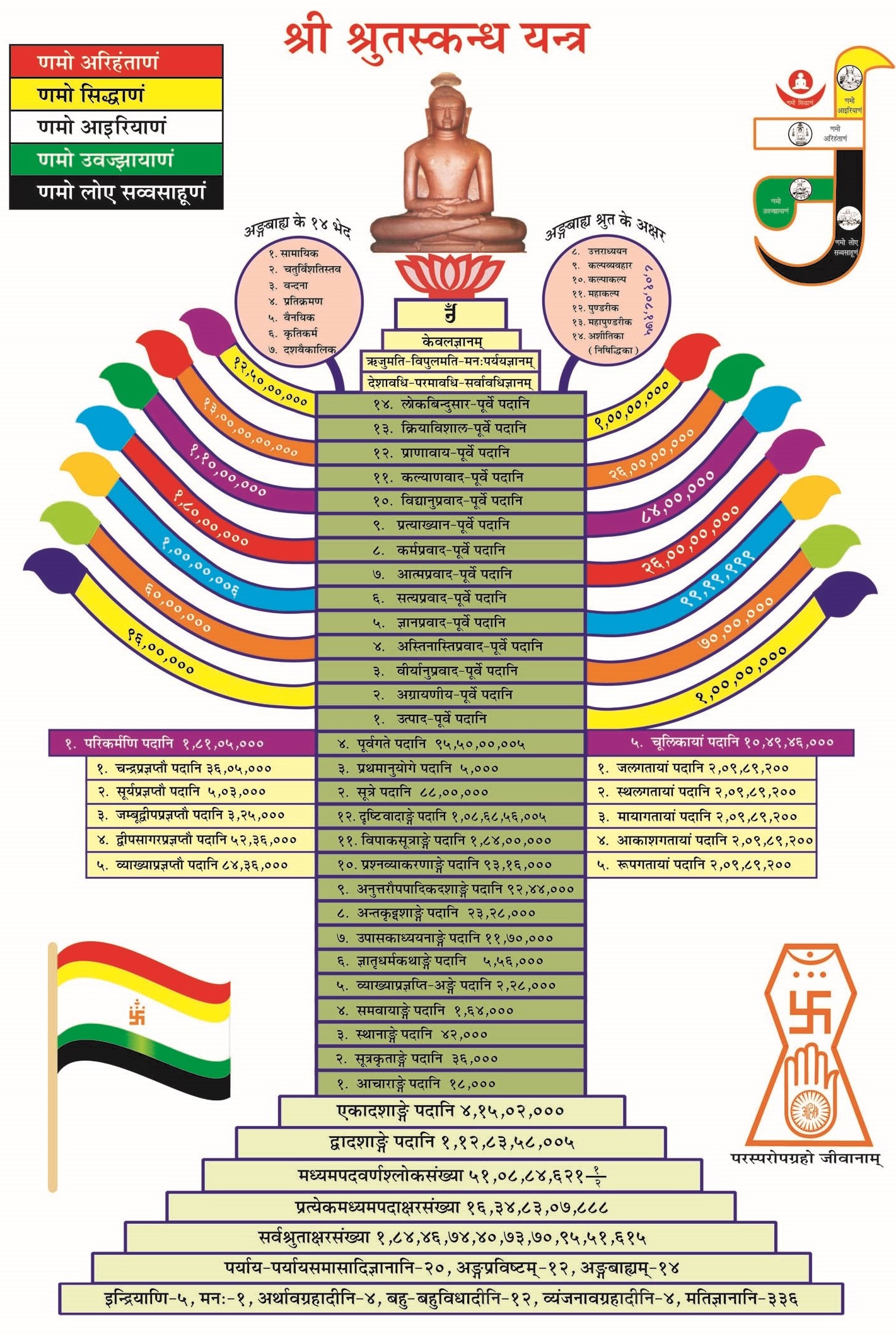nikkyjain@gmail.com
Date : 17-Nov-2022
Index

!! श्रीसर्वज्ञवीतरागाय नम: !!
श्रीमद्-भगवत्पूज्यपाद-आचार्य-प्रणीत
श्री
इष्टोपदेश
मूल संस्कृत गाथा
आभार : पंडित आशाधरजी
🏠
!! नम: श्रीसर्वज्ञवीतरागाय !!
ओंकारं बिन्दुसंयुक्तं नित्यं ध्यायन्ति योगिनः
कामदं मोक्षदं चैव ॐकाराय नमो नम: ॥1॥
अविरलशब्दघनौघप्रक्षालितसकलभूतलकलंका
मुनिभिरूपासिततीर्था सरस्वती हरतु नो दुरितान् ॥2॥
अज्ञानतिमिरान्धानां ज्ञानाञ्जनशलाकया
चक्षुरुन्मीलितं येन तस्मै श्रीगुरवे नम: ॥3॥
॥ श्रीपरमगुरुवे नम:, परम्पराचार्यगुरुवे नम: ॥
सकलकलुषविध्वंसकं, श्रेयसां परिवर्धकं, धर्मसम्बन्धकं, भव्यजीवमन: प्रतिबोधकारकं, पुण्यप्रकाशकं, पापप्रणाशकमिदं शास्त्रं श्री-इष्टोपदेश नामधेयं, अस्य मूल-ग्रन्थकर्तार: श्री-सर्वज्ञ-देवास्तदुत्तर-ग्रन्थ-कर्तार: श्री-गणधर-देवा: प्रति-गणधर-देवास्तेषां वचनानुसार-मासाद्य आचार्य श्री-पूज्यपाद-देव विरचितं ॥
॥ श्रोतार: सावधानतया शृणवन्तु ॥
मंगलं भगवान् वीरो मंगलं गौतमो गणी
मंगलं कुन्दकुन्दार्यो जैनधर्मोऽस्तु मंगलम् ॥
सर्वमंगलमांगल्यं सर्वकल्याणकारकं
प्रधानं सर्वधर्माणां जैनं जयतु शासनम् ॥
सुध्यान में लवलीन हो जब, घातिया चारों हने ।
सर्वज्ञ बोध विरागता को, पा लिया तब आपने ॥
उपदेश दे हितकर अनेकों, भव्य निज सम कर लिये ।
रविज्ञान किरण प्रकाश डालो, वीर! मेरे भी हिये ॥
स्याद्वाद, नय, षट् द्रव्य, गुण, पर्याय और प्रमाण का ।
जड़कर्म चेतन बंध का, अरु कर्म के अवसान का ॥
कहकर स्वरूप यथार्थ जग का, जो किया उपकार है ।
उसके लिये जिनवाणी माँ को, वंदना शत बार है ॥
नि:संग हैं जो वायुसम, निर्लेप हैं आकाश से ।
निज आत्म में ही विहरते, जीवन न पर की आस से ॥
जिनके निकट सिंहादि पशु भी, भूल जाते क्रूरता ।
उन दिव्य गुरुओं की अहो! कैसी अलौकिक शूरता ॥
🏠
यस्य स्वयं स्वाभावाप्ति, रभावे कृत्स्नकर्मण:
तस्मै संज्ञान-रूपाय नमोऽस्तु परमात्मने ॥1॥
Meaning : I make obeisance to the Omniscient Supreme Being who has attained, by own effort, the purity of His soul-nature by destroying all karmas.
🏠
योग्योपादानयोगेन, दृषद: स्वर्णता मता
द्रव्यादिस्वादिसंपत्तावात्मनोऽप्यात्मता मता ॥2॥
Meaning : As particular ore, on the availability of proper purifying agents, gets to its intrinsic identity, that is, gold, similarly, the soul, on the manifestation of its aspects like substance, attains self-identity .
🏠
वरं व्रतै: पदं दैवं, नाव्रतैर्वत नारकम्
छायातपस्थयो र्भेद: प्रतिपालयतोर्महान् ॥3॥
Meaning : It is better to observe vows and austerities that lead to birth as a celestial being than to lead a vowless life of sensual pleasures that leads to birth as an infernal being. The difference between the two can be summed up by an analogy: when two persons have to wait for the arrival of another person, one spends his time in the comfort of the shade, while the other in the heat of the sun.
🏠
यत्र भाव: शिवं दत्ते, द्यौ: कियद्दूरवर्तिनी
यो नयत्याशु गव्यूतिं क्रोशार्धे किं स सीदति ॥4॥
Meaning : When through meditation on the soul a man can attain the supreme status, that is, liberation, how far can the heavens be from him? Will a person accustomed to carrying a load to a distance of four miles get tired if he has to carry it just one mile?
🏠
हृषीकज -मनातङ्कं दीर्घ - कालोपलालितम्
नाके नाकौकसां सौख्यं, नाके नाकौकसामिव ॥5॥
Meaning : The residents of the heavens enjoy happiness that appertains to the senses, free from disruptions, lasts for an exceedingly long period of time and has no parallel outside the heavens.
🏠
वासनामात्रमेवैतत्सुखं दु:खं च देहिनाम्
तथा ह्युद्वेजयन्त्येते, भोगा रोगा इवापदि ॥6॥
Meaning : Pleasure and pain that appertain to the body are only notional; these are aberrations in the natural state of bliss that appertains to the soul. In an agitated state of the mind, sensual pleasures result into disquiet like that caused by an illness.
🏠
मोहेन संवृतं ज्ञानं, स्वभावं लभते न हि
मत्त: पुमान् पदार्थानां यथा मदन-कोद्रवै: ॥7॥
Meaning : After consuming intoxicating grain called "kodrava', the man loses his power to know, with due discrimination, the real nature of things; in the same way, the knowing Self, when covered with delusion, fails to comprehend the true nature of substances.
🏠
वपुर्गृहं धनं दारा:, पुत्रा मित्राणि शत्रव:
सर्वथान्यस्वभावानि, मूढ: स्वानि प्रपद्यते ॥8॥
Meaning : Entities, like the body, the house, the wealth, the wife, the son, the friend, and the foe, have attributes which are distinct from the soul; still, a deluded person considers these as his own.
🏠
दिग्देशेभ्य: खगा एत्य, संवसन्ति नगे नगे
स्वस्वकार्यवशाद्यान्ति, देशे दिक्षु प्रगे प्रगे ॥9॥
Meaning : At dusk, birds from different directions and regions get themselves perched on trees, but at the break of the day, fly off, in their pursuits, to different directions and destinations.
🏠
विराधक: कथं हन्त्रे जनाय परिकुप्यति
त्र्यड्.गुलं पातयन् पद्भ्यां स्वयं दण्डेन पात्यते ॥10॥
Meaning : There is no reason why a person who inflicts pain or suffering on someone else should get angry when that individual does the same to him. He who knocks down the 'trayangura'with both his feet is himself bound to be felled due to the nature of the equipment.
🏠
रागद्वेषद्वयीदीर्घ - नेत्राकर्षण- कर्मणा
अज्ञानात्सुचिरं जीव:, संसाराब्धौ भ्रमत्यसौ ॥11॥
Meaning : Our soul, due to nescience , keeps on pulling either end of the long rope - one end symbolizing attachment and the other aversion - and, as a consequence, whirls round in the cycle of births and deaths for a very long time.
🏠
विपद्भवपदावर्ते पदिकेवातिवाह्यते
यावत्तावद्भवन्त्यन्या: प्रचुरा विपद: पुर: ॥12॥
Meaning : In a water-wheel used to hoist water, as one bucket is emptied many others are ready to be emptied; in the same way, in our worldly life, before we get over one misery, many more are ready to overtake us.
🏠
दुरर्ज्येनासुरक्षेणनश्वरेणधनादिना ।
स्वस्थंमन्यो जनः कोऽपि ज्वरवानिव सर्पिषा ॥13॥
Meaning : The man who considers wealth, which involves hardship in its acquisition and protection, and perishes ultimately, as a source of well-being is like the man who, down with a fever, erroneously imagines to have regained vigour after consuming clarified butter .
🏠
विपत्तिमात्मनो मूढ:, परेषामिव नेक्षते
दह्यमान-मृगाकीर्णवनान्तर - तरुस्थवत् ॥14॥
Meaning : The man who fails to realize that afflictions that befall others will one day run into him is like the man who, sitting on the top of a tree in a burning forest, feels safe while the deer and other animals are being consumed by the fire.
🏠
आयुर्वृद्धिक्षयोत्कर्ष-, हेतुं कालस्य निर्गमम्
वाञ्छतां धनिनामिष्टं, जीवितात्सुतरां धनम् ॥15॥
Meaning : The passage of time increases wealth due to the accrual of interest but draws nearer the end of life. Those who look forward to increasing wealth, therefore, have no love for their lives.
🏠
त्यागाय श्रेयसे वित्तमवित्त: सञ्चिनोति य:
स्वशरीरं स पङ्केन, स्नास्यामीति विलिम्पति ॥16॥
Meaning : The poor man who accumulates wealth so as to be able to spend it in future on virtuous activities, like giving of gifts, is like the man who deliberately soils his body with mud thinking that he will clean it later on by bathing.
🏠
आरम्भे तापकान् प्राप्तावतृप्तिप्रतिपादकान्
अन्ते सुदुस्त्यजान् कामान् कामं क: सेवते सुधी: ॥17॥
Meaning : Which wise man would relish sense-gratifying objects, consumable and non-consumable, that cause unease in acquisition, insatiateness on enjoyment, and despair on separation, with unbridled infatuation?
🏠
भवन्ति प्राप्य यत्सङ्गमशुचीनि शुचीन्यपि
स काय: सन्ततापायस्तदर्थं प्रार्थना वृथा ॥18॥
Meaning : Knowing that on contact with the body even pure objects are rendered impure, and that the body is home to many afflictions and woes, to provide it with the objects of pleasure makes no sense.
🏠
यज्जीवस्योपकाराय, तद्देहस्यापकारकम्
यद्देहस्योपकाराय, तज्जीवस्यापकारकम् ॥19॥
Meaning : Actions that are intended for the enrichment of the soul discard the welfare of the body, and the actions intended for the welfare of the body undermine soul-enrichment.
🏠
इतश्चिन्तामणिर्दिव्य इत: पिण्याकखण्डकम्
ध्यानेन चेदुभे लभ्ये क्वाद्रियन्तां विवेकिन: ॥20॥
Meaning : One can obtain either the divine, wish-fulfilling jewel or the pieces of oilcake through the power of meditation; which of these will a man of discrimination wish for?
🏠
स्वसंवेदन सुव्यक्तस्तनुमात्रो निरत्यय:
अत्यन्तसौख्यवानात्मा, लोकालोकविलोकन: ॥21॥
Meaning : The soul is the knower of the universe and the nonuniverse , of the nature of infinite bliss, coextensive with the body, eternal, and is known adequately through self-realization.
🏠
संयम्य करणग्राममेकाग्रत्वेन चेतस:
आत्मानमात्मवान् ध्यायेदात्मनैवात्मनि स्थितम् ॥22॥
Meaning : The man who has overpowered his senses through the fire of concentration of the mind should, seated in his own Self, contemplate on the Self, through the medium of the Self.
🏠
अज्ञानोपास्तिरज्ञानं, ज्ञानं ज्ञानिसमाश्रय:
ददाति यत्तु यस्यास्ति, सुप्रसिद्धमिदं वच: ॥23॥
Meaning : Devotion to ignorance imparts nescience, and devotion to learning imparts knowledge; it is a well known fact that only that which one possesses can be given to the other.
🏠
परीषहाद्यविज्ञानादास्रवस्य निरोधिनी
जायतेऽध्यात्मयोगेन, कर्मणामाशु निर्जरा ॥24॥
Meaning : When one meditates on the soul, unmindful of the trials and tribulations of life, the influx of karmas gets blocked and their shedding takes place.
🏠
कटस्य कत्र्ताहमिति, सम्बन्ध: स्याद् द्वयोद्र्वयो:
ध्यानं ध्येयं यदात्मैव, सम्बन्ध: कीदृशस्तदा ॥25॥
Meaning : When someone says, "I am the maker of the mat," the interrelationship between two different entities, the doer of activity and the object of activity, is clear. But in real meditation, as the soul becomes the instrument as well as the object of meditation, how can there be any duality?
🏠
बध्यते मुच्यते जीव:, सममो निर्मम: क्रमात्
तस्मात्सर्वप्रयत्नेन, निर्ममत्वं विचिन्तयेत् ॥26॥
Meaning : The soul that entertains infatuation with the outside objects gets into bondage of karmas and the soul that entertains no such infatuation is freed from bondage. Try persistently, therefore, to renounce all infatuation.
🏠
एकोऽहं निर्मम: शुद्धो, ज्ञानी योगीन्द्रगोचर:
बाह्या: संयोगजा भावा, मत्त: सर्वेऽपि सर्वथा ॥27॥
Meaning : I am one, without infatuation, pure, all-knowing, and capable to be known by the Master Ascetics. All attachments, internal and external, are totally foreign to my nature.
🏠
दु:खसंदोहभागित्वं, संयोगादिह देहिनाम्
त्यजाम्येनं तत: सर्वं, मनोवाक्कायकर्मभि: ॥28॥
Meaning : The soul, due to its association with the non-soul body and the like, has to live through many afflictions. I, therefore, renounce all such association, along with the activities of the mind, speech and body.
🏠
न मे मृत्यु: कुतो भीतिर्न मे व्याधि: कुतो व्यथा
नाहं बालो न वृद्धोऽहं, न युवैतानि पुद्गले ॥29॥
Meaning : I do not die; what should I fear death for? I do not suffer from disease; what can cause me pain? I am not a child; I am not an old man; I am not a young man. All these attributes are found only in physical matter.
🏠
भुक्तोज्झिता मुहुर्मोहान्मया सर्वेऽपि पुद्गला:
उच्छिष्टेष्विव तेष्वद्य, मम विज्ञस्य का स्पृहा ॥30॥
Meaning : Owing to delusion, I have enjoyed and then discarded, many times over, all existing material objects. Now that I have acquired wisdom, what wish could I have to enjoy those leftovers again?
🏠
कर्म कर्म हिताबन्धि, जीवो जीवहितस्पृह:
स्वस्वप्रभावभूयस्त्वे, स्वार्थं को वा न वाञ्छति ॥31॥
Meaning : Karmas work in their interest and the soul works in its interest. It is but natural; who does not wish to expand own influence?
🏠
परोपकृतिमुत्सृज्य, स्वोपकारपरो भव
उपकुर्वन्परस्याज्ञो, दृश्यमानस्य लोकवत् ॥32॥
Meaning : Engage in doing own good rather than of others; this is the way of the world. It is out of ignorance that you engage in the service of visible objects like the body, and not the Self.
🏠
गुरूपदेशादभ्यासात्संवित्ते: स्वपरान्तरम्
जानाति य: स जानाति, मोक्षसौख्यं निरन्तरम् ॥33॥
Meaning : The one who has understood the distinction between the Self and the non-self through the teachings of the preceptor, constant practice, and self-reflection, foresees constantly the happiness that appertains to the liberated soul.
🏠
स्वस्मिन् सदभिलाषित्वादभीष्टज्ञापकत्वत:
स्वयं हितप्रयोक्तृत्वादात्मैव गुरुरात्मन: ॥34॥
Meaning : As the soul longs for own well-being , promulgates the path that leads to it, and engages in its realization, therefore, it is its own preceptor.
🏠
नाज्ञो विज्ञत्वमायाति, विज्ञो नाज्ञत्वमृच्छति
निमित्तमात्र-मन्यस्तु, गतेर्धर्मास्तिकायवत् ॥35॥
Meaning : It is not possible for the Truth to be acquired by those not qualified for its acquisition, and the knower of the Truth cannot become devoid of it. Teaching by others is an external facilitator just as the medium of motion is to the movement of objects.
🏠
अभवच्चित्तविक्षेप, एकान्ते तत्त्वसंस्थित:
अभ्यस्येदभियोगेन, योगी तत्त्वं निजात्मन: ॥36॥
Meaning : The Yogi whose mind is without perturbation and is established in the knowledge of the Self should diligently practice meditation on the nature of the soul, in solitude.
🏠
यथा यथा समायाति, संवित्तौ तत्त्वमुत्तमम्
तथा तथा न रोचन्ते, विषया: सुलभा अपि ॥37॥
Meaning : As the Yogi advances in the realization of the pure nature of his soul, even close at hand objects of sense-indulgence appear increasingly unattractive.
🏠
यथा यथा न रोचन्ते, विषया: सुलभा अपि
तथा तथा समायाति, संवित्तौ तत्त्वमुत्तमम् ॥38॥
Meaning : As even the close at hand objects of sense-indulgence start appearing unattractive, the Yogi increasingly comes closer to the realization of the pure Self.
🏠
निशामयति निश्शेषमिन्द्रजालोपमं जगत्
स्पृहयत्यात्मलाभाय, गत्वान्यत्रानुतप्यते ॥39॥
Meaning : The whole world appears illusory to the Yogi engaged in the process of self-realization. If ever he gets entangled in any worldly object, he expiates his transgression.
🏠
इच्छत्येकान्तसंवासं निर्जनं जनितादर:
निज कार्यवशात्किञ्चिदुक्त्वा विस्मरति द्रुतम् ॥40॥
Meaning : The Yogi longs for solitude and distances himself from interaction with men. If due to some reason he has to communicate with them, he soon puts it out of his mind.
🏠
ब्रुवन्नपि हि न ब्रूते गच्छन्नपि न गच्छति
स्थिरीकृतात्मतत्त्वस्तु, पश्यन्नपि न पश्यति ॥41॥
Meaning : The Yogi who is established firmly in self-identity does not speak while speaking, does not walk while walking, and does not see while seeing.
🏠
किमिदं कीदृशं कस्य, कस्मात्क्वेत्यविशेषयन्
स्वदेहमपि नावैति योगी योगपरायण: ॥42॥
Meaning : The Yogi engrossed in self-realization is far removed from all inquisitive dispositions about the soul, such as, what is it? what is its nature? whom does it belong to? where does it come from? and where does it reside? He is free from the awareness of even his body.
🏠
यो यत्र निवसन्नास्ते, स तत्र कुरुते रतिम्
यो यत्र रमते तस्मादन्यत्र स न गच्छति ॥43॥
Meaning : Wherever the man sets his abode, he gets attached to the place and thereafter does not wish to go elsewhere.
🏠
अगच्छंस्तद्विशेषाणामनभिज्ञश्च जायते
अज्ञाततद्विशेषस्तु, बध्यते न विमुच्यते ॥44॥
Meaning : The Yogi, not digressing from the contemplation of the Self, does not think about the nature of alien objects, and, as he remains inattentive to alien objects, not only is he not bound by karmas but gets released from them.
🏠
पर: परस्ततो दु:खमात्मैवात्मा तत: सुखम्
अत एव महात्मानस्तन्निमित्तं कृतोद्यमा: ॥45॥
Meaning : An alien object is always alien and is the cause of suffering; the soul is always own and is the cause of happiness. All great sages, therefore, have exerted themselves only for the sake of the soul.
🏠
अविद्वान् पुद्गलद्रव्यं योऽभिनन्दति तस्य तत्
न जातु जन्तो: सामीप्यं,चतुर्गतिषु मुञ्चति ॥46॥
Meaning : Believing the matter to be the soul, the ignorant gets attached to it and, as a result, the matter does not leave the soul in its four states of existence .
🏠
आत्मानुष्ठाननिष्ठस्य, व्यवहारबहि: स्थिते:
जायते परमानन्द: कश्चिद्योगेन योगिन: ॥47॥
Meaning : The Yogi established firmly in the Self, away from worldly occupations, experiences supreme kind of happiness in his being.
🏠
आनन्दो निर्दहत्युद्धं कर्मेन्धनमनारतम्
न चासौ खिद्यते योगी, बहिर्दु:खेष्वचेतन: ॥48॥
Meaning : The supreme happiness that is generated in the soul acts like the fire that burns the accumulated karmic fuel, and the Yogi remains impervious to external pain, maintaining tranquility.
🏠
अविद्याभिदुरं ज्योति:, परं ज्ञानमयं महत्
तत्प्रष्टव्यं तदेष्टव्यं, तद्द्रष्टव्यं मुमुक्षुभि: ॥49॥
Meaning : Self-knowledge is the excellent and supreme light that destroys the darkness of ignorance. It is pertinent, therefore, that the aspirant after liberation should query about it, long for it, and live through it.
🏠
जीवोऽन्य: पुद्गलश्चान्य इत्यसौ तत्त्वसंग्रह:
यदन्यदुच्यते किञ्चित्सोऽस्तु तस्यैव विस्तर: ॥50॥
Meaning : The soul is distinct from the matter and the matter is distinct from the soul; this is the quintessence of reality. All the rest of articulation is but an elaboration of the same.
🏠
इष्टोपदेशमिति सम्यगधीत्य धीमान्,
मानापमानसमतां स्वमताद्वितन्य ॥
मुक्ताग्रहो विनिवसन् सजने वने वा,
मुक्तिश्रियं निरुपमामुपयाति भव्य: ॥51॥
Meaning : Thus, on reading and understanding the essence of this Istopadesa - The Golden Discourse - the potential aspirant to liberation , the city-dweller or the woodsdweller, through self-knowledge, maintaining equanimity in honour and disgrace, obtains the matchless treasure of liberation .
🏠



